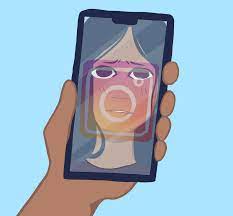
Social media has taken society by storm. According to a survey conducted by University of Nevada’s School of Medicine, over 90% of teenagers use social media and approximately 75% have at least one social media profile by the age of 17.
While social media has enabled people to build relationships, express themselves and become more educated, it also has downsides.
Social media is not as much of a hobby as it was before, but more of a guidebook to how you should look, act and perceive yourself. Unfortunately, this has had a detrimental effect on the way women — young women and girls in particular — view themselves.
As women scroll through their feed, they are unknowingly comparing themselves to what they see, affecting their self-esteem. This leads women to adopt traits that are unhealthy as they compare themselves to unrealistic beauty standards that they are exposed to online.
Precious Robles, a third-year pre-physical therapy major at Florida A&M University, recalls a time where she witnessed this happen.
“I do feel like women compare themselves to social media and what other females look like,” Robles said. “I had a friend who used to compare herself to other people and she had a lot of issues dealing with that, but I have seen it happen before and it always has to do with social media.”
Another study done by behavioral scientist Clarissa Silva suggests that 60 percent of people using social media reported that it has impacted their self-esteem in a negative way.
Nowadays, you will rarely catch someone posting a picture or video that does not utilize a filter or has not been edited even the slightest bit. More and more women want to appear just as perfect as the women they compare themselves to, and fear others seeing their flaws.
Some women no longer bother to post anything as they want to avoid being judged altogether.
The idea of women trying to meet unrealistic beauty standards even goes beyond social media. Today, some women won’t dare leave the house without makeup on in order to look and feel as good about themselves as the women they see on social media. Little do they know, the women that they strive to look like are the same women who are editing their photos and giving a false sense of who they actually are.
The Journal of the American Medical Association’s psychiatry network found that adolescents spending more than three hours per day using social media are at increased risk for mental health problems, including anxiety, depression, and negative self-image and internalizing problems.
How do platforms made to entertain us come to have such a negative effect on the way women view themselves, and how do we stop the cycle?
It is only natural that we compare ourselves to what we see online. Leon Festinger, a social psychologist, argued that social comparison is a form of sociological self-esteem where people make downward social comparisons to feel good about themselves. So, conversely, upward social comparisons also take place where our self-esteem is then affected negatively as we compare ourselves to those who look better and seem to be doing better than us.
This does not have to be the end all, be all, though. It may not be easy, but women can grow back the confidence that they have begun to lack.
This can be done by periodically taking breaks from social media in order to free ourselves from the toll that it can take on our mental health. According to bgavel.com, a study done at the University of Pennsylvania was able to report that there were significant reductions in loneliness and depression for a non-control group that restricted daily time spent on Snapchat, Facebook and Instagram.
Instead, this time can be invested in healthy practices that promote self-love such as journaling your thoughts, treating yourself to a day of self-care or even reciting positive affirmations on a regular basis.
By adopting some of these practices, women can begin to love the true version of themselves, rather than the one social media creates.